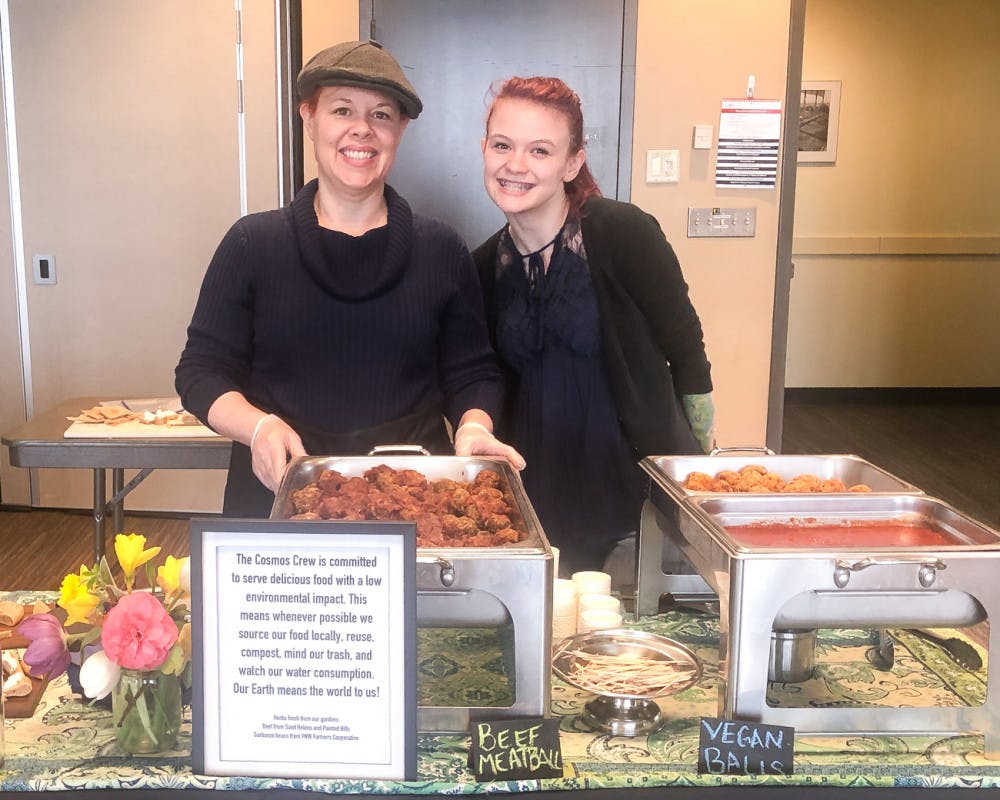
Cinnamon and Astrid Berg from Cosmos Bistro pose for a portrait at the Sustainability Fair on April 18, 2019. // Photo by Lauren Gallup
Vendors from local restaurants gathered at the Sustainable Food Fair in the Viking Union on Thursday, April 18, to share their passion for food sustainability. The event, organized by the Associated Students Environmental Center, was put on in celebration of Earth Day on Monday, April 22.
At the fair, students, staff and faculty got the opportunity to try food from six different restaurants, all of which aim to serve local and sustainable food.
Boundary Bay Brewery provided samples of macaroni and cheese at the fair. Ilana Knudsen, catering manager at Boundary Bay, said the brewery tries to stick to sustainable practices when making their food.
“A lot of the food products we serve at Boundary we source from local farms, especially during the summer time,” Knudsen said.
Knudsen spoke of the different elements of sustainability they use in their cuisine.
“We try to focus on how Boundary as a business can also support our community,” Knudsen said. “In my opinion, [local ingredients] also lead us to be serving a better product.”
Other vendors at the fair included Twin Sisters Brewing and Cosmos Bistro.
Bree Daigneault, a student at Western, was at the fair tabling with the clubs Students for Sustainable Food and Food Systems Working Group. Students for Sustainable Food meets weekly to spread awareness and educate students about sustainable food alternatives on Western’s campus, according to the group’s Facebook page.
“I think food is power, absolutely, and so I think that’s very important for students, because [in the academic setting], we need to fuel our minds and our bodies, and we do that through food. So, I think it’s very important that we not only know where our food is coming from, but we know that it’s good for us,” Daigneault said.
Food Systems Working Group meets once a month to create solutions for more sustainable eating on campus, Daigneault said. The group is “working on product shifts in the dining halls and across campus to reach Western’s goal of meeting 25% of the Real Food Guidelines,” Daigneault said.
“In Zoe’s Bagels, all the bagels are now made with organic flour,” Daigneault said, which are some of the ways Food Systems Working Group has inspired change.
Members of Students for Sustainable Food are hoping to put together a leaflet to encourage awareness of where food is coming from and brands to buy from to further educate students about food sustainability, Daigneault said.
Tara and Nate Johnson, owners of Sage Against the Machine, a new vegan food truck in Bellingham, were at the event to serve food and share their commitment to sustainability.
Sage Against the Machine is certified as an Ocean Friendly business by the Surfrider Foundation. This certification is given to companies that take steps, like getting rid of plastic bags and straws, to show their commitment to protecting the oceans, as stated in Surfrider Foundation’s Ocean Friendly Restaurants pamphlet.
Johnson said they wanted to come to Western to show people they can eat vegan and enjoy it.
“It’s not about just the food, it’s about meeting new people and changing people, and making them smile,” Nate Knudsen said.
Joseph Watts, a Western student who attended the fair, said sustainability is important to him when choosing what to eat.
“Eating sustainably is a great thing to strive for,” Watts said, adding that he doesn’t see some of the on-campus eateries, such as Subway and Starbucks, doing much to be sustainable. “[They have] a lot of waste, a lot of wrapping.”
Watts said being on south campus a lot means that he doesn’t have easy access to the food vendors that he loves in vendor’s row. He said this is a problem because many students don’t have access to the sustainable food options on campus.
Western Dining Services also featured a booth at the fair. Steve Erbe, campus executive chef, spoke about some of the ways Western Dining Services are contributing to food sustainability.
“We’re working with the Northwest Agricultural Business Center right now, and we’re working with local farms and we’re getting a grant to put into place that’s going to help local farms get into the wholesale business. So, what that means is more prepackaged products, more products in higher volume will be available to the public,” Watts said.
The grant that they're working on getting allows local farmers to provide higher volume of products to sellers which would help them provide food throughout the year, Erbe said.
According to Erbe, food sustainability is about answering the question: “How can we keep our money and our volume back into our community?”
Western Dining Services currently sources from 55 local partners, Erbe said.

Lauren Gallup (she/her) is the spring 2021 managing editor of The Front. She is a fourth-year news/editorial journalism major, whose writing has been featured in Klipsun, 425 and South Sound magazines. Her reporting seeks to answer, provoke and increase understanding. You can find her retweeting great journalism @thelaurengallup or reach her at laurengallup.westernfront@gmail.com.





